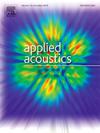Enhancing long-distance speech signals using PDMA speech enhancement system
IF 3.4
2区 物理与天体物理
Q1 ACOUSTICS
引用次数: 0
Abstract
In long-distance scenarios, the energy of speech signals rapidly attenuates with increasing propagation distance. Traditional acquisition devices alone find it challenging to capture weak speech signals. Even when acoustic amplification is used, the low signal-to-noise ratio (SNR) renders traditional speech enhancement methods ineffective. To address this challenge, this paper proposes a speech enhancement system that integrates both acquisition hardware and back-end algorithms. Specifically, the hardware module of the system consists of a parabolic reflector designed to amplify the sound pressure and a differential microphone array aimed at suppressing noise interference. Complementing this, the algorithmic component employs a deep-learning-based Generative Filter Summation Network (GfsNet), which effectively integrates signals captured from these two hardware modalities, thereby significantly improving speech quality. Simulation and comparative experimental results show that the proposed algorithm can achieve 8.43 dB SNR gain in part of the test for the presence of multiple noise interference sources in the long-distance scene from 10 meters to 80 meters. The Speech quality (PESQ) is improved to 3.12, and the intelligibility (STOI) is improved to 0.57 under the best conditions. The proposed system shows excellent enhancement results in complex and multiple noise source environments.
利用PDMA语音增强系统增强远距离语音信号
在远距离场景下,语音信号的能量随着传播距离的增加而迅速衰减。传统的采集设备很难捕捉到微弱的语音信号。即使使用声放大,低信噪比(SNR)使得传统的语音增强方法无效。为了解决这一挑战,本文提出了一种集成了采集硬件和后端算法的语音增强系统。具体来说,系统的硬件模块包括一个用于放大声压的抛物面反射器和一个用于抑制噪声干扰的差分麦克风阵列。作为补充,算法组件采用了基于深度学习的生成滤波求和网络(GfsNet),它有效地集成了从这两种硬件模式捕获的信号,从而显著提高了语音质量。仿真和对比实验结果表明,在10 ~ 80米远距离场景中存在多个噪声源的情况下,该算法在部分测试中可以实现8.43 dB信噪比增益。在最佳条件下,语音质量(PESQ)提高到3.12,可理解度(STOI)提高到0.57。该系统在复杂、多噪声源环境下具有良好的增强效果。
本文章由计算机程序翻译,如有差异,请以英文原文为准。
求助全文
约1分钟内获得全文
求助全文
来源期刊

Applied Acoustics
物理-声学
CiteScore
7.40
自引率
11.80%
发文量
618
审稿时长
7.5 months
期刊介绍:
Since its launch in 1968, Applied Acoustics has been publishing high quality research papers providing state-of-the-art coverage of research findings for engineers and scientists involved in applications of acoustics in the widest sense.
Applied Acoustics looks not only at recent developments in the understanding of acoustics but also at ways of exploiting that understanding. The Journal aims to encourage the exchange of practical experience through publication and in so doing creates a fund of technological information that can be used for solving related problems. The presentation of information in graphical or tabular form is especially encouraged. If a report of a mathematical development is a necessary part of a paper it is important to ensure that it is there only as an integral part of a practical solution to a problem and is supported by data. Applied Acoustics encourages the exchange of practical experience in the following ways: • Complete Papers • Short Technical Notes • Review Articles; and thereby provides a wealth of technological information that can be used to solve related problems.
Manuscripts that address all fields of applications of acoustics ranging from medicine and NDT to the environment and buildings are welcome.
 求助内容:
求助内容: 应助结果提醒方式:
应助结果提醒方式:


